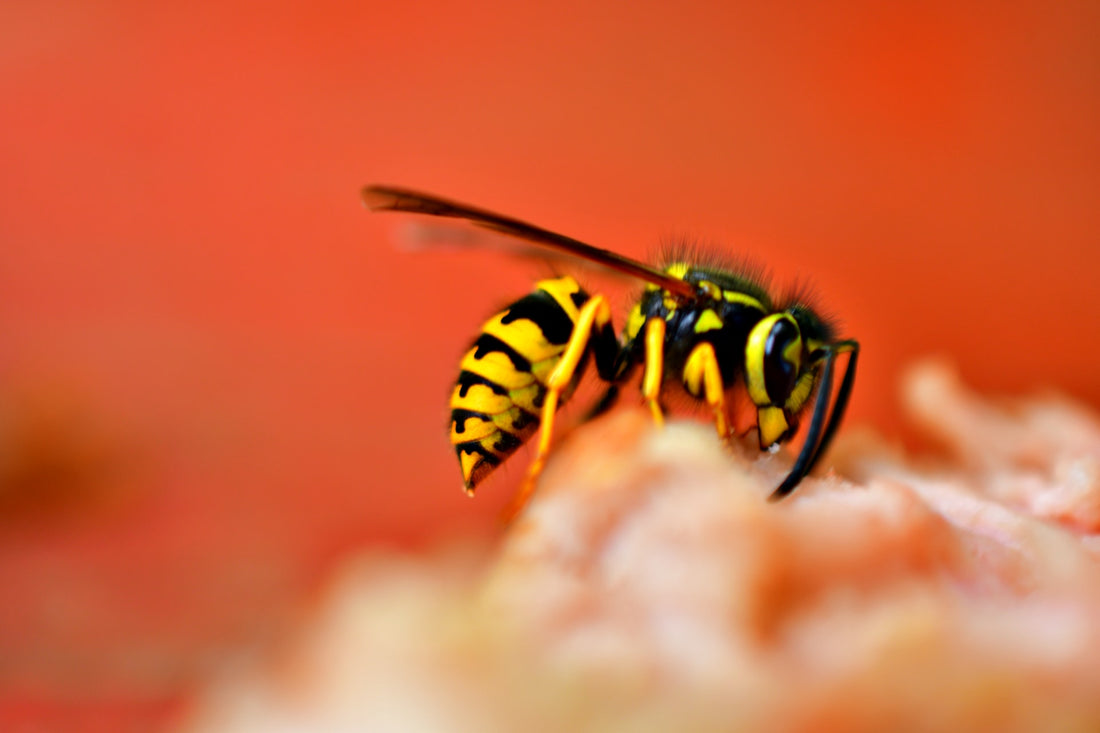How To Treat a Wasp Sting
- person Gary Tramer
- calendar_today
- comment 0 comments

Wasps sting as a defense mechanism. That’s right, where you might default to making jokes or delving into a hobby, wasps just go right for stinging. Unlike the honeybee, wasps do not die after stinging you. In fact, wasps are likely to sting multiple times over the course of their lifetimes. How fun for us.
If you notice a wasp, it is best to avoid it however possible. A single wasp should not pose much of a threat. Simply resist the urge to swat it away, and your odds of going without a sting are high. Unfortunately, wasps also have their bad days (who doesn’t?), so it’s possible to get stung even despite your best efforts.
You are also more likely to get stung by one of these pesky bugs if you find yourself near their hive. This is common sense for the vast majority of people, but if you see a whole bunch of wasps near a tree, you should probably not hang out around that tree. This is a great lesson to instill in your kids, as well.
What Are the Most Common Symptoms of a Wasp Sting?
Getting stung by a wasp is never fun. The actual moment where you get stung is painful, but you might have to endure several hours or even days of unpleasantness after the fact. This is already distressing for adults, but being stung by an insect can result in quite a few tears from our kids.
The vast majority of people will only experience mild to moderate symptoms, but they can still range from person to person. Here are some of the most common wasp sting reactions to look out for and how severe they are.
Mild Wasp Sting Symptoms
In the case of a mild wasp sting reaction, there will likely be some pain immediately after the fact. This is perfectly normal and shouldn’t necessarily be a cause for alarm. This pain is generally a stinging or burning sensation, but it should lessen as time goes on. Afterward, some swelling is common, as is a tender red spot or welt appearing around the sting.
Moderate Wasp Sting Symptoms
The next tier up from a mild wasp sting reaction is a moderate reaction. Depending on how much these symptoms interfere with your daily life, you may or may not want to seek out options to help alleviate them.
This kind of reaction often manifests in slightly more prominent swelling, or even swelling that increases over the next few days rather than go down. More redness and itchiness are also possible, as is developing hives around the area.
Is a Severe Reaction to a Wasp Sting Possible?
As with any other allergen, it is possible to experience a more severe reaction than most. You are more likely to experience a serious reaction if you have experienced bad reactions in the past to this allergen or to similar allergens like bee stings.
If you have never been stung before, consider your parents’ reactions. If they experience severe symptoms resulting from a sting, you are more likely to require additional care as well.
The good news is that most of the time, the first allergic reaction is somewhat less severe. This can serve as a warning that you should be prepared for possible future reactions.
Symptoms of a Severe Sting Reaction
The symptoms of a severe reaction will be similar regardless of whether you are reacting to wasp venom, a yellow jacket sting, a hornet sting, or another insect sting. The most dangerous kind of severe allergic reaction that requires immediate medical attention is anaphylaxis.
An anaphylactic reaction is generally characterized by a few different serious symptoms that can occur soon after exposure to the allergen, typically within several minutes. This condition is also commonly referred to as “anaphylactic shock” because it causes your body to go into a state of shock.
As a result, sufferers experience serious difficulty breathing, an irregular heart rate, and a rapid decline in blood pressure. This kind of potentially life-threatening insect sting allergy response requires immediate medical treatment. Until paramedics can arrive, epinephrine or an EpiPen should be administered to the reacting individual.
If you or a family member experience a severe reaction to stinging insects or any other allergen, discuss it with your doctor. They might recommend carrying a bee sting kit with you or other healthcare options. Most people will not require emergency medicine in response to a wasp sting, but it’s always best to be aware and prepared.
What To Do Right After Being Stung by a Wasp
Immediately after being stung by a wasp, people tend to panic. However, as long as you know what to do, you can spring into action.
Here’s a potential plan to store in your back pocket:
Thoroughly Wash the Site of the Sting
Unlike in the case of a bee sting, wasps do not lose their stingers when they sting you. We used the word “sting” a lot in that sentence, but it was necessary. If a bee stinger was still lodged in the skin, you would need to take a pair of tweezers or even a credit card to remove it as soon as possible.
Wash the sting site as soon as possible with soap and warm water. This will help to disinfect the area and also has the added benefit of potentially clearing out any additional venom left behind.
Apply a Cold Compress or Ice Pack
After you have washed and dried the sting site, it is time to deal with the swelling before it fully sets in. You can do this by applying a cold compress to the area. An ice pack or even actual ice can help stop the swelling, but wrap it in a towel first. Prolonged direct exposure to ice can do more harm than good.
By putting ice on the skin for ten minutes on and ten minutes off, the spot will also be slightly numbed. Hopefully, this will make it less uncomfortable.
Do Not Irritate the Sting Area Further
Some amount of itchiness and discomfort is typical after being stung by a wasp, but it is important to quell the discomfort as much as possible for a few reasons:
First of all, no one likes feeling itchy and swollen. Second, these feelings can cause you to start scratching or rubbing at the area, only to further irritate and exacerbate the issue.
In general, leaving the area alone other than a thorough wash and applying a cold pack of some kind is for the best. This is also the case with bug bites rather than bug stings.
However, we might still require home remedies to help local reactions feel better quickly:
How To Stop Kids From Scratching a Wasp Sting
Adults will understand that they should not pick at the affected area, but this can often be easier said than done. On the other hand, kids will experience this discomfort and also may not understand why they should leave the sting alone. In either of these situations, we have a solution that does not involve anything over-the-counter.
Harsh chemical solutions like hydrocortisone cream come with a whole host of potential side effects, so we prefer to keep it all-natural. Our MagicPatch Itch Relief Patches skip the chemicals in favor of an innovative grid-relief technology that promotes healthy lymphatic drainage. Put a patch right over the affected area and sit back as your kid’s itching improves.
This patch was originally engineered to help soothe mosquito bites, but it can be helpful in improving other insect sting sites too.
When To See a Doctor After Being Stung by a Wasp
Of course, if any kind of first aid is required or even might be required, it is integral to get to a doctor immediately. However, it is also possible to experience a more prolonged response that occurs over several days or weeks.
If you notice that your sting or your child’s sting is not improving after a certain time, it is a wise idea to get to a doctor sooner rather than later.
How To Reduce Allergy Symptoms
For allergy symptoms that can be calmed at home, without the use of a side effect causing antihistamine, we recommend the AllergyPatch Allergy Relief Stickers. With the help of these essential oil patches, watery eyes and itchy noses won’t stand a chance.
How To Avoid Bugs in General
The spring and summer months are often associated with an inevitable uptick — get it, tick — in creepy crawlies. While this is true to an extent, the warmer weather does not have to spell disaster. When you and your family are armed with a natural insect repellent, you can enjoy the outdoors to the fullest.
BuzzPatch Mosquito Repellent Patches will help keep you and your family bug-free, naturally. With a special blend of essential oils, these adorable stickers work wonders for both kids and adults.
Wasp Up With That?
Questionable puns aside, most wasp stings can be easily and comfortably soothed at home. With the right mixture of home remedies, patience, and oversight, you and your kids should be feeling better before you know it.
Sources:
How to Remove a Bee Stinger and Treat the Sting | Verywell Health
Bee and Wasp Sting: Symptoms, Treatment, and Home Remedies | Medical News Today

